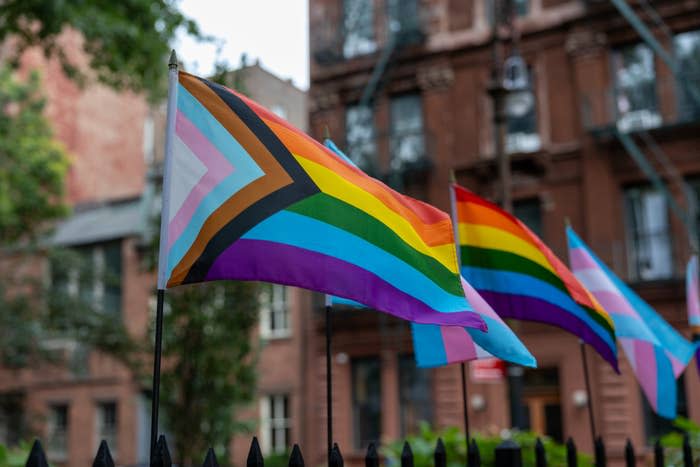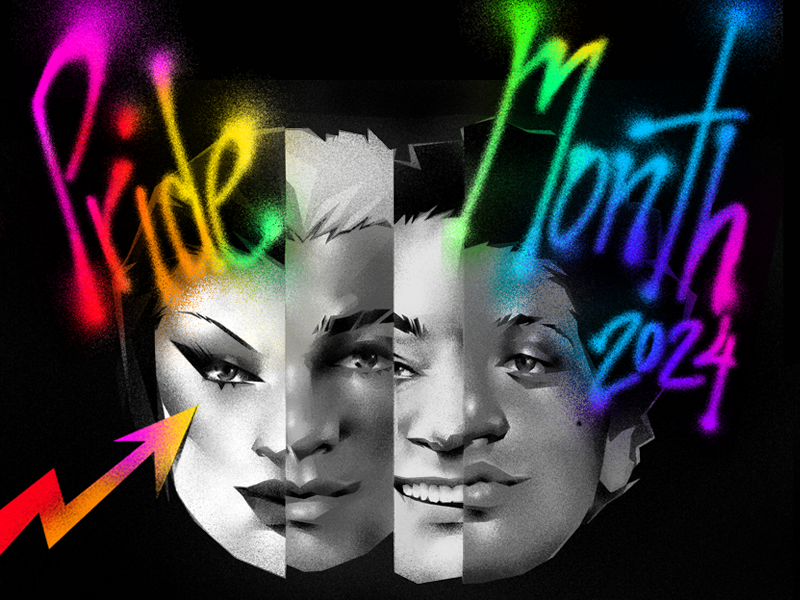It's A Weird Time To Be Queer At Work. Here's How This Nonbinary CEO Pushes Their Company To Do Better

It's Pride Month — which means it's time once again to celebrate the beauty and bravery of the LGBTQ+ community.

If you work in corporate America, this might also be the time when your company changes its profile pic on social media to the company logo in rainbow colors and pats itself on the back for doing "allyship."
Though acceptance of queer people has come a long way in our lifetimes, we're also in a moment of growing backlash.
Politically, Republican legislators in several states have banned gender-affirming care for transgender youth and taken aim at drag performances and Pride events. In the business realm, companies like Target, which once boasted big Pride displays in their stores, have scaled back their offerings due to conservative protest.
If your company encourages you to "bring your whole self to work," how do you square that with signals from the broader culture that it could be dangerous to be authentically you if you happen to be queer? This year's Out at Work Guide from LinkedIn and Impact Media offers insight into how queer professionals are working through this fraught moment.
LinkedIn's data shows that although 66% of the LGBTQ+ professionals they surveyed feel that they have an ally at work, 75% still feel pressure to "code switch."
"Code-switching" refers to changing the way you speak and act depending on who you're with. Members of minority groups, in particular, tend to code-switch in order to blend in more with the dominant culture. This Key and Peele sketch, "Obama Meet and Greet," is a great illustration of code-switching in action.
According to LinkedIn's data, there are several reasons why LGBTQ+ people opt to code-switch at work. In their poll, 74% said they do it to avoid being negatively stereotyped.
57% said they did not feel comfortable with sharing their identity at work, 44% feared being treated differently, 40% hoped that code-switching would help them move up the ladder, and 36% did it out of fear of facing hostility from management and/or coworkers.
LinkedIn's report also features insights from 24-year-old Tim Chau, the CEO and Founder of the Gen Z media company Impact Media.
To learn more about their story, I reached out to Chau via email. They told BuzzFeed that their first work experiences were incredibly exhausting because of the pressure to constantly hide their identity.
Chau explained, "Growing up, I worked at my family’s restaurant, and some of the staff there were quite homophobic. I spent numerous years being harassed and bullied at work, and I had to just bear with it. I wasn’t — and couldn’t be — out at work because that would mean coming out to my family. I had to code-switch constantly. By the end of the workday, I would be extremely fatigued not just from the physical exertion but also the mental exhaustion of playing a different persona."
They went on to share how working for a startup with a more accepting culture contrasted with their early experiences of not feeling safe to express themself. "In some ways, queer culture is the opposite of work culture. The corporate world rewards masculinity and normativity, but being queer is all about breaking out of these hierarchies and conventions. When I worked at my first startup job, I was really lucky to have a CEO that created a safe space."
"He wanted everyone to exist as they are, and that was the first time I felt like I didn’t have to hide under a 'work self.' I didn’t have to worry about the pitch of my speaking voice, and I was free to dress in ways that veer from gender norms without judgment. It was liberating. Both of these very different experiences have informed the kind of work environment I wanted to create for my own company."
Now, as a CEO, Chau says that inclusivity is truly at the heart of the way their company operates. "In many professional spaces, there’s an assumption of straight and cis as the default, and so queer people can feel like they’re making a big statement when they’re simply expressing themselves. But it shouldn’t be that way. At Impact, we make sure that our work culture includes queer culture. I like to think that we’re 'queering' business norms."
Chau says that having queer leadership within a company sends a signal to every employee that it's a safe place to be authentically themselves. "One key factor that has allowed Impact to create a safe space for LGBTQ+ people is simply having LGBTQ+ leadership. This might sound straightforward, but it’s pretty rare in the corporate world."
"As an unabashedly queer CEO, I set a tone that communicates to the entire company that they don’t have to hide who they are."
Finally, Chau shared how other business leaders can make their companies truly inclusive to the LGBTQ+ community. "A company cannot be a queer-friendly workplace without intentionally finding ways for queer professionals to feel safe and seen. What is your business doing to support queer individuals year-round? How many members of your leadership are LGBTQ+ and speak about it publicly? How is your team incorporating pronoun use? These factors encourage more LGBTQ+ people to apply for and be excited about your company."
"This generation is more queer than ever before, and we have to make sure we’re centering these identities rather than placing them on the margins."
If you're an LGBTQ+ professional, do you feel like you have to code-switch at work? What signals to you that a workplace is truly safe and inclusive? Share your experiences in the comments below!
Looking for more LGBTQ+ or Pride content? Then check out all of BuzzFeed's posts celebrating Pride 2024.



